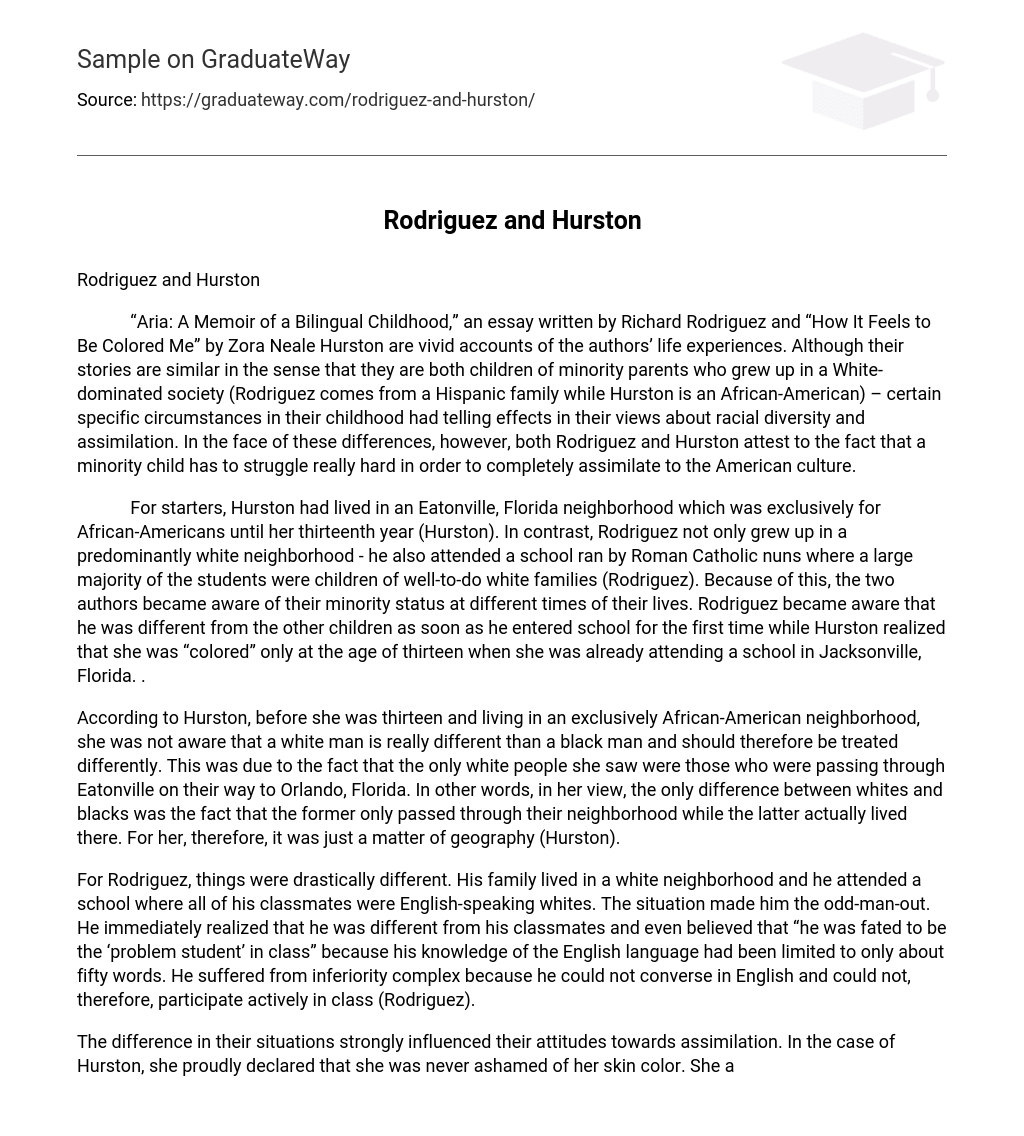“Aria: A Memoir of a Bilingual Childhood,” an essay written by Richard Rodriguez and “How It Feels to Be Colored Me” by Zora Neale Hurston are vivid accounts of the authors’ life experiences. Although their stories are similar in the sense that they are both children of minority parents who grew up in a White-dominated society (Rodriguez comes from a Hispanic family while Hurston is an African-American) – certain specific circumstances in their childhood had telling effects in their views about racial diversity and assimilation. In the face of these differences, however, both Rodriguez and Hurston attest to the fact that a minority child has to struggle really hard in order to completely assimilate to the American culture.
For starters, Hurston had lived in an Eatonville, Florida neighborhood which was exclusively for African-Americans until her thirteenth year (Hurston). In contrast, Rodriguez not only grew up in a predominantly white neighborhood – he also attended a school ran by Roman Catholic nuns where a large majority of the students were children of well-to-do white families (Rodriguez). Because of this, the two authors became aware of their minority status at different times of their lives. Rodriguez became aware that he was different from the other children as soon as he entered school for the first time while Hurston realized that she was “colored” only at the age of thirteen when she was already attending a school in Jacksonville, Florida. .
According to Hurston, before she was thirteen and living in an exclusively African-American neighborhood, she was not aware that a white man is really different than a black man and should therefore be treated differently. This was due to the fact that the only white people she saw were those who were passing through Eatonville on their way to Orlando, Florida. In other words, in her view, the only difference between whites and blacks was the fact that the former only passed through their neighborhood while the latter actually lived there. For her, therefore, it was just a matter of geography (Hurston).
For Rodriguez, things were drastically different. His family lived in a white neighborhood and he attended a school where all of his classmates were English-speaking whites. The situation made him the odd-man-out. He immediately realized that he was different from his classmates and even believed that “he was fated to be the ‘problem student’ in class” because his knowledge of the English language had been limited to only about fifty words. He suffered from inferiority complex because he could not converse in English and could not, therefore, participate actively in class (Rodriguez).
The difference in their situations strongly influenced their attitudes towards assimilation. In the case of Hurston, she proudly declared that she was never ashamed of her skin color. She also believed that as a descendant of slaves, she was being provided with a good opportunity to advance. Therefore, according to her, she should make the most out of her situation. She refused to be held back by the fact that her ancestors were slaves by justifying that “Slavery is the price I paid for civilization, and the choice was not with me. It is a bully adventure and worth all that I have paid through my ancestors for it. No one on earth ever had a greater chance for glory.” In other words, she had no trouble acquiring a public identity because she believed that slavery was already in the past, African-Americans were already free, and their descendants could rightfully assert their claim to their American citizenship (Hurston).
Rodriguez, on the other hand, who started his first day of school being the odd-man-out, took a longer time acquiring a public identity. Since he could not speak fluent English, he was reduced to listening others speak. He could only speak his heart out when he was at home and could speak Spanish. The situation developed in him the belief that he could only experience a public identity once he could already converse fully in English. In the privacy of his home, he thought that he could maintain his private identity by speaking Spanish as before and preserve his Hispanic culture. However, he later learned that the Catholic nuns were correct when they said that he could only learn English properly if he would speak the language both in public and in the privacy of his home. With the help of his parents who started speaking English at home at the behest of the nuns, Rodriguez was able to master the language, started experiencing a public identity, and became fully assimilated to the American culture (Rodriguez). Because of his experience, Rodriguez now holds the belief that advancement within American society could only be possible for minorities if they conform to the culture of that society.
Works Cited
Hurston, Zora Neale. “How It Feels to Be Colored Me.” 16 February 2009.
<http://mapsites.net/gotham08/Docs/Hurston.htm>
Rodriguez, Richard. “Aria: A Memoir of a Bilingual Childhood.” American Scholar 50.
(1981): 25-42. 16 February 2009.
<http://www.csus.edu/englishta/TA/Readings/RodriguezAria.pdf>





